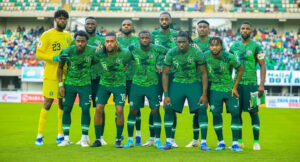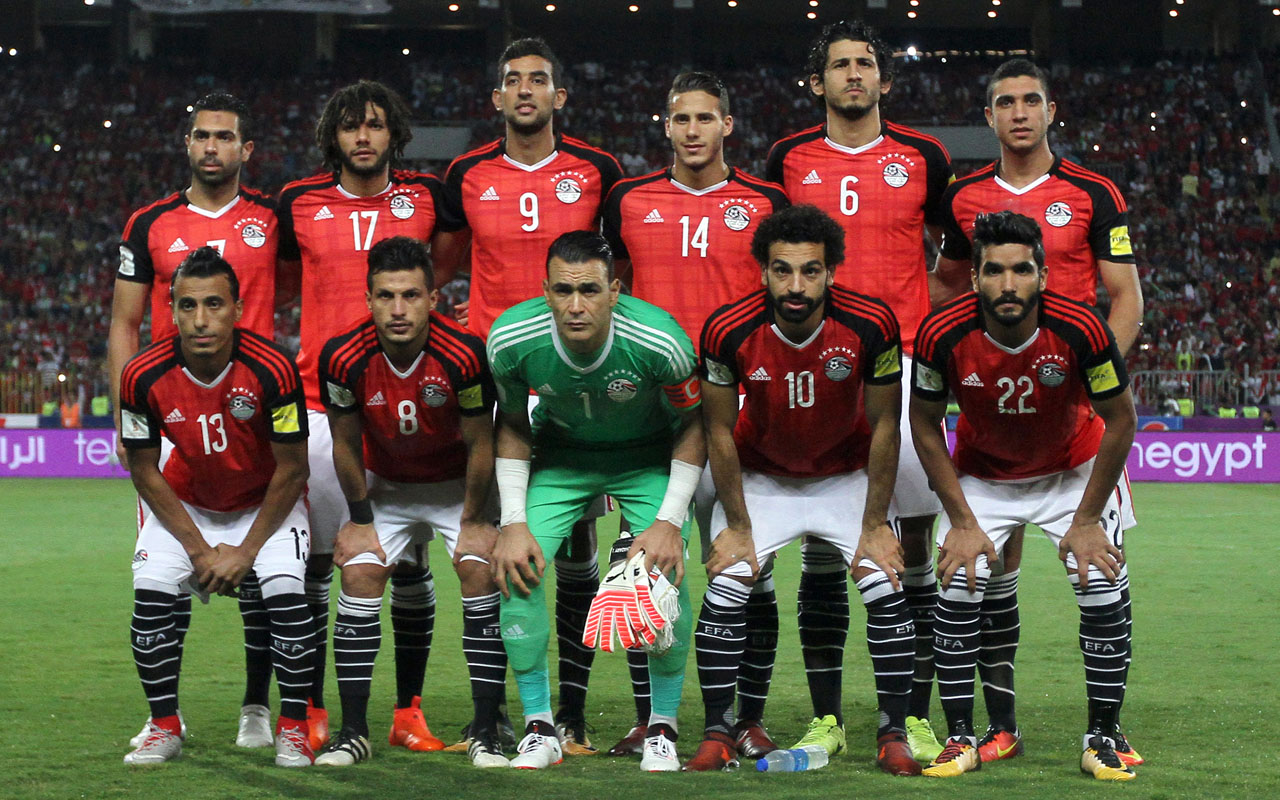National teams in Africa and across the world have nicknames peculiar to them.
African teams are not exceptions with nicknames that depict so many things.
Some depict the national flag, colour, food, history, language, culture,the most resilient animals, and the tradition of the country amongst others.
24 teams will be traveling to Cote d’Ivoire for the 2023 African Cup of Nations (AFCON) in January. These national teams all have nicknames which are sometimes more popular.
Below are the nicknames of the team heading to the Elephant Nation from the first to the last groups.

Cote D’Ivoire: Les Elephants (The Elephants)
The Côte D’Ivoire national team is nicknamed the Elephants. This is because elephants were the most prevalent animals in Cote d’Ivoire in the past. It reflects the gagangtual nature of the national team and a call for strength.
Nigeria: Super Eagles
Nigeria’s nickname is homage to the Eagle in the country’s Coat of Arms. They metamorphosed from the Green Eagles to the Super Eagles after losing to Cameroon in the 1988 Africa Cup of Nations final, something that is rooted in classic one-upmanship.
Equatorial Guinea: Nzalang Nacional (National Thunder), Los Elefantes (The Elephants)
The Nzalang Nacional derived from natural phenomena in “thunderstorm”.
In David Rubadiri’s poem, “African thunderstorm”, the havoc the thunderstorm in Africa cam result in cam be very grave with consequential outcomes.
This explains the reason for adopting the nickname Nzalang Nacional, meaning “National Thunder” by the Equato-Guinean national team.
Guinea Bissau: Djurtus
The national team got their names from Djurtus (African wild dogs).
The African wild dogs are also known as the painted dogs or cape hunting dogs.
It is a wild canine native to Sub-Saharan Africa ad the largest wild canine in Africa.
The African wild dog have been respected in several hunter-gatherer societies.
This nickname is basically related to the ancient Egyptians. Pharaohs were those kings in old Egypt who made great achievements, like building the Pyramids which are one of the world’s wonders.
The team also carries the name of “Prostraters”, since players usually celebrate their victory with prostration. This was clear during the previous AFCON editions in 2006, 2008, and 2010.
Ghana: Black Stars
The Black Stars – originated from the five-pointed black star in the middle of the Ghana national flag. The Football Associations of Ghana felt it made sense to adopt the moniker because it would foster unity not only in the country, but across the continent as well.
Cape Verde: Tubaroes Azuis (Blue Sharks), Crioulos (Creoles)
Cape Verde got there nicknames from “Creoles” and “Blue Sharks”.
Creoles is a person of mixed European and black descent especially in the Caribbean.
It is also a mother tongue formed from the contact of European languages (especially English, French, Spanish, or Portuguese) with local languages (especially African languages spoken by slaves in the West Indices).
Blue Sharks, also known as the great blue Sharks. It is a species of requiem shark, in the family carcharhinidae, which inhabits deep waters in the world’s temperate and tropical oceans.
It is listed as Near Threatened by the International Union for Conservation of Nature (IUCN).
Mozambique: Os Mambas (The Black Mambas)
The Mozambique national football team has the colloquial the ‘black mambas’. A black mamba is known to be
one of the most dangerous snakes in the world and many of its bites on human beings result in death. The Mamba is also known for its pace and ability to defeat any purported ‘intruder’ within its territory. This snake is thus associated with extreme danger. Therefore, the Mozambique team nicknamed after a mamba signifies the like features like pace, ability to strike (score) and defeat an opponent regardless of their size.

Senegal: Lions de la Teranga (Lions of Teranga)
Teranga is a word visitors hear a lot in Senegal. It’s a Wolof word, meaning hospitality or welcoming generosity.
However, Senegalese people say, it goes beyond mere hospitality. Teranga is not just a title, but a reflection of the nature of the Senegalese people who receive their guests with open arms, and allow them to enter their homes, meet their family members, and talk about their lives, religion, culture, and their own personal ideas. The lives of president Augustine Senghor and captain Sadio Mane say it all.

Cameroon: Les Lions Indomptables (The Indomitable Lions)
Cameroon’s national team is nicknamed the Indomitable Lions meaning ‘impossible to subdue or defeat’.
The team was initially nicknamed the Lion going by the fact that the Lion is considered the country’s most important and powerful animal.
However, in 1972, the national team nickname was changed and the word indomitable was added, renaming them the Indomitable Lions.
The name followed their fight for independence from European colonial masters France and Britain.
President Ahmadou Ahidjo – the first president of the United Republic of Cameroon – approved the request from his then sports minister to add the word to their nickname ensuring they were more recognisable and impressive.
This change yielded fruits as the Indomitable Lions enjoyed a period of dominance in the Africa Cup of Nations just after – winning the 1984 and 1988 tournaments.
Guinea: Syli National (National Elephants)
Syli nationale” in the local language means “National Elephants”. In their culture, the elephant is a symbol of strength and unity. The 1976 AFCON runners-up are expected to be at their best in Côte D’Ivoire.
Gambia: The Scorpions
From an animal with eight legs, Gambia national team derived their nickname.
Scorpions are easily recognised by a pair of grasping pincers and a narrow, segmented tails, often carried in a characteristic forward curve over the back and aways ending with a stinger. The mainly love in deserts.

Algeria: The Greens, The Fennec Foxes, The Desert Warriors
The Algerian national team has several nicknames: Desert Foxes, Desert Fighters, and The Greens. The desert fox lives in North Africa and some parts of the Arabian Peninsula in Saudi Arabia. It is distinct for its large ears. The 2019 AFCON champions under Djamel Belmadi will be hoping to resonate with what they represent during their stay in Côte D’Ivoire.
Burkina Faso: Les Etalons (The Stallions)
In the symbol of Burkina Faso Football Federation, there are two Stallions showing the national team.
Stallions are make horse that has not been castrated. The have presence of hormones such as testosterone giving Stallions a thicker, cresty neck with more muscular physique.
Mauritania: Al-Murabitun (Lions of Chinguetti)
This nickname refers to the Almoravid dynasty which was an imperial Berber Muslim dynasty that emerged in the 5th and 6th AH in the Islamic Maghreb region. They will make it to their second AFCON tournament in Côte D’Ivoire.
Angola: Palancas Negras (Black Sable Antelopes)
Angola’s national team is nicknamed “sable black antelopes” as they are the prevalent animals in the tropical jungles across Angola.
This particular species is characterized by its large size, athletic and rarity – apparently the only one of its
kind in the world and only found in Angola. Therefore the animal is considered one of a highly treasured government trophy. The importance of this animal is exemplified by the government’s decision to inscribe
its image in banknotes, passports, and even post stamps. In African mythologies, including that of Angolans, this legendary antelope, symbolizes beauty, vivacity, and visual sharpness. Several ethnic
groups in Africa regard the antelope as a significant animal as it is known to be a “form taken by some gods and only the creature itself knows where these gods are to be found”. In this case, the Angolan national team is taken to resemble this animal’s attributes which translate into skills, athleticism, and excellence on the field of play. More significantly, the nickname symbolizes the team as a national asset whose
importance nears that of this national trophy.
Tunisia: Eagles of Carthage
Carthage is the cradle of the Tunisian civilization and the capital of the ancient Phoenician state. This nickname for the 2004 AFCON winners was chosen to suit their strength and speed while referring to the civilization of Carthage.
Mali: Les Aigles (The Eagles)
The name Eagles is from a strong bird “Eagles” showing the strength, speed, and resilience of the animal in the team.

South Africa: Bafana Bafana
In the Zulu language “Bafana” means “Boys”. When South Africa joined FIFA after the toppling of the racist apartheid regime, officials of football in South Africa started looking for a nickname for their football team. A journalist named Pero Meselco suggested the nickname as a reflection of youth. At first, football officials were not excited since the name does not represent strong brave men, however quickly the nickname was loved by football fans and spread among them, becoming the team’s official nickname very quickly.
Namibia: Brave Warriors
The Brave Warriors (Namibia)
We have combined the two nations in this section since both use similar nicknames except that the
Namibian national football team’s nickname warriors is modified by the adjective brave, thus the Brave
Warriors, while the Zimbabwe national team is known as the Warriors. The difference is in the use of the adjective brave. The word ‘warrior’ according to the Free Online Dictionary, has its origin from the French word werreieur means to make ‘war’. Thus the word warrior implies one who engages or is experienced in ‘warfare’. The concept of warrior is well-known and written about in most African histories when kingdoms fought battles against one another for power and dominion. Every kingdom
had an army of warriors whose role was not only to protect the ethnic group and kingship from invaders but also to save their people from any possible enslavement. Sometimes warriors could be invaders of other people’s territory upon orders from their leader.
The main distinctive features of warriors are bravery, strength, and a spirit of unity to conquer enemies.
These features are what particularly inspire the nicknames of the respective national football teams. It is
bravery, experience, strength, and unity that a team needs in order to succeed in the sport of football. In fact, a warrior is expected to be skilled at his job, and thus skill is also part of the motivation for the nickname in football as it is important for any successful team. Interestingly, the word warrior already
indexes bravery but yet the adjective ‘brave’ is regularly used to reinforce the kind of ‘bravery’ expected from the warriors.
Morocco: The Atlas Lions
This nickname was derived from the Atlantic mountains passing through Morocco. The Atlas Lions represent a whole lot to the football-loving people of Morocco especially at a time the efforts of King Mohamed VI are yielding huge fruits as illustrated during the 2022 FIFA World Cup when the country became Africa’s first to reach the Semi-final of the global showpiece.
Democratic Republic of Congo (DRC): Les Leopards (The Leopards)
The Leopards In 1997-2006, the team was nicknamed ‘the Simba’ a Swahili word meaning ‘the Lions’ but it was then unpopular to non-Swahili speakers. It was not until 2007-to now that it was named the Leopards.
Zambia: Chipolopolo (The Copper Bullets)
Chipolopolo – means copper bullets, this word originated from the copper mines in the historic city of Kitwe.
The Chipolopolo is a transformation from the KK 11. The team was first named after the country’s founding president, Kenneth Kaunda.
However, in 1993 the team opted for the frightening bullet nickname in 1993 to reflect an area of commerce in the country.
The copper bullets pierced through the hearts of Lions and falcons of Jediane (Sudan) and Ivory Coast as they conquered the continent in 2012.
Tanzania: Taifa Stars
The name is from the Swahili word for “nation” and “Stars” meaning national stars.
It is an indication of the significance of English in anything football in Tanzania.
Copyright 2023©kick442.com.
All rights reserved. This material and any other digital content on this platform may not be reproduced, published, broadcasted, written in full or parts, without a written permission from our management
This site is not responsible for contents displayed by external sites
